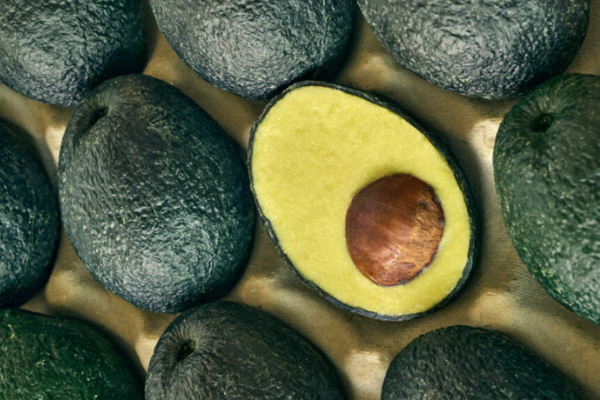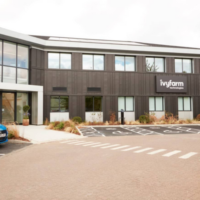Every week we track the business, tech and investment trends in CPG, retail, restaurants, agriculture, cooking and health, so you don’t have to. Here are some of this week’s top headlines.
We may someday enjoy avocados without contributing to the environmental issues surrounding this energy- and water-intensive crop. Arina Shokouhi, a recent Material Futures graduate from University of Arts London’s Central Saint Martins college, just unveiled the “Evocado.” This avocado alternative is made using ingredients found in Britain, including broad beans, hazelnuts, apple, and rapeseed oil.
Elsewhere in foodtech, leather alternatives are multiplying as startups reveal materials made from mycelium, tamarind pods, and other natural resources.
Our newsletter takes a lot of time and resources to produce. Make a one time or monthly contribution to help us keep it going. Whether it’s $5 or $500, every bit helps and shows us that you value our work.
1. British Ingredients Used to Recreate the Avocado – Food Matters Live
Arina Shokouhi, a recent graduate from University of Arts London’s Central Saint Martins college, used a combination of broad beans, hazelnuts, apple and rapeseed oil to design the “Evocado.”
2. Meet Leukeather, Leather Alternative Made From River Tamarind Pods – Vegconomist
The latest leather alternative has been developed by UAE-based Egyptian architect Nuhayr Zein. The material is made from the dried pods of Leucaena, also known as river tamarind.
3. Regenerative Thinking: The Foundation of Hope – Salvatierra Farms Blog
Regi Haslett-Marroquin of Minnesota’s Salvatierra Farms discusses a blueprint for how we can collectively transform the agriculture sector based on regenerative thinking.
4. Fun Guys Can Keep the Sun Off with MycoWorks’ New Mycelium-Based Hats – AFN
The startup has launched a line of hats made from its Reishi alt-leather product in partnership with Los Angeles-based milliner Nick Fouquet.
5. Food Delivery Companies Are Revamping Amid Downturn – Reuters
In the midst of the current cost-of-living crunch, companies like Grubhub will be judged on whether they meet margin, not growth, targets. Companies are reducing costs and exiting unprofitable markets in response.
6. From Starbucks to a Korean BBQ, Wage Workers Know They Deserve More – Los Angeles Times
The current waves of unionizing suggest that it’s time to update the social contract underlying our economy and treat essential workers as though they are truly essential.
7. Meati Raises $150M to Make Nutrient-Dense Meat Analogues – AFN
The company uses mushroom root to recreate products like chicken breast, jerky, and steak. Series C funding from Revolution Growth, Chipotle, and others will go towards finalizing a new production facility.
8. Humanity Facing ‘Collective Suicide’ Over Climate Crisis, Warns UN Chief – The Guardian
As countries around the world fight extreme heat, UN Chief António Guterres tells governments that “half of humanity is in danger zone.”
9. Kitchen United Raises $100M From Kroger, Others – Grocery Dive
Circle K, Simon Property Group and Restaurant Brands International also participated. The ghost kitchen operator plans to expand from 15 locations to over 500 locations over the next five years using many malls, shopping centers and supermarkets operated by new investors.
10. Lab-Grown Meatballs Are ‘Ready for Mass Production’ – South China Morning Post
Researchers in China say they have developed a “cell factory” to industrialize production of cultivated meat. Their cultivated meatballs were found to be “substantially higher” in protein than Chinese pork meatballs in a comparison.
11. FreshRealm Raises $200M for Fresh Food Meal Kits – Crunchbase
FreshRealm specializes in ready-to-eat and ready-to-cook meal kits sold in grocery stores. Funding will go towards investing in tech that can strengthen supply chain and sourcing issues.
12.Vegans Should Stop Exaggerating Health Claims of Plant-Based Diets – Fast Company
Plant-based diets have plenty of health benefits. But like most things on the internet, a grain of truth gets stretched far beyond the bounds of what science can actually prove.
13. Climate Change Is Not Negotiable – NY Times
The threat to Americans’ lives posed by climate change is urgent and severe, and requires more commitment than it’s getting from elected members of government.
14. “My People Have Lived in the Amazon for 6,000 Years: You Need to Listen to Us” – Climate Change News
Indigenous leader and activist from the Brazilian Amazon Txai Suruí writers that her peoples’ mission to protect nature is becoming impossible thanks to corporations that see the land as commodities.
15. Carbon Captured and Stored Since 1996 ‘Significant But Overestimated’ – Environmental Science & Technology Letters
A new report from the Imperial College London compared estimates of stored carbon with official reports. The latter overestimate actual carbon stored by 19% to 30%.






